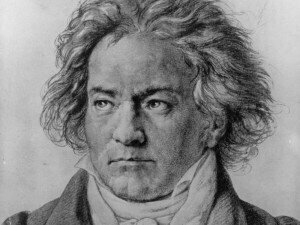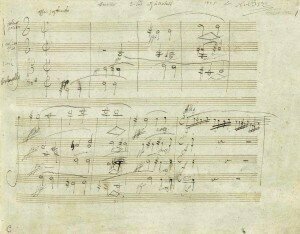
Beethoven

Beethoventempel , Baden
Ludwig van Beethoven: String Quartet No. 15, Op. 132
 Beethoven’s personal physician Dr. Braunhofer gave him strict orders, “No wine, no coffee, no spices of any kind. I’ll wager that if you take a drink of spirits, you will be lying weak and exhausted on your back in a few hours.” Once Beethoven had sufficiently recovered, he departed for spa treatment at the village of Baden on 7 May, and except occasional visits to the city, stayed there until mid-October. He alarmingly wrote to his doctor during his stay, “I am still weak… and I spit up rather a lot of blood… Often it streams out of my nose, and there is no doubt that my stomach has become terribly weak.” Beethoven did find time to compose, and there can be no doubt that his ailment found it’s way into the Op. 132 string quartet. Uncharacteristically, Beethoven headed the third movement with the inscription “Heiliger Dankgesang eines Genesenen an die Gottheit, in der lydischen Tonart” (Song of Thanksgiving to the Deity from a convalescent in the Lydian mode). This emotional center of the composition is an autobiographical musical offering of a prayer of thanks after his illness. The Beethoven scholar Maynard Solomon writes, “the music here appears to become an implicit agency of healing, a talisman against death.” First performed in public on 6 November 1825, it arguably is the most profoundly soulful music Beethoven ever composed.
Beethoven’s personal physician Dr. Braunhofer gave him strict orders, “No wine, no coffee, no spices of any kind. I’ll wager that if you take a drink of spirits, you will be lying weak and exhausted on your back in a few hours.” Once Beethoven had sufficiently recovered, he departed for spa treatment at the village of Baden on 7 May, and except occasional visits to the city, stayed there until mid-October. He alarmingly wrote to his doctor during his stay, “I am still weak… and I spit up rather a lot of blood… Often it streams out of my nose, and there is no doubt that my stomach has become terribly weak.” Beethoven did find time to compose, and there can be no doubt that his ailment found it’s way into the Op. 132 string quartet. Uncharacteristically, Beethoven headed the third movement with the inscription “Heiliger Dankgesang eines Genesenen an die Gottheit, in der lydischen Tonart” (Song of Thanksgiving to the Deity from a convalescent in the Lydian mode). This emotional center of the composition is an autobiographical musical offering of a prayer of thanks after his illness. The Beethoven scholar Maynard Solomon writes, “the music here appears to become an implicit agency of healing, a talisman against death.” First performed in public on 6 November 1825, it arguably is the most profoundly soulful music Beethoven ever composed.